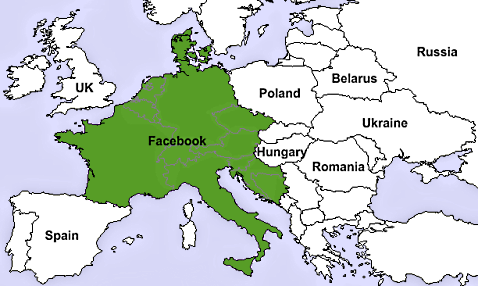Generation Y: 'Email is unfashionable and outdated'

Steve Clayton, Microsoft extraordinaire and geek in disguise, posted an interesting set of statistics over the weekend, via Socialnomics, on the social media revolution - the movement where media and information spreads far and wide through social techniques; Twitter and Facebook being the two best examples.
Students, or "Generation Y" seem to have taken a shine in these statistics, with the rest relating to social web interaction and other interesting social networking facts.
If Facebook were a country, it would be the world’s fourth largest between the United States and Indonesia.
That's true but something that has been covered before. However since then it has grown to roughly 270 million users which makes up the entire population of France, Germany, Belgium, the Netherlands, Italy, the Czech Republic, Austria, Slovenia, Croatia, Bosnia and Switzerland put together.

2009 US Department of Education study revealed that on average, online students out performed those receiving face-to-face instruction.
This baffles me as it doesn't go into detail. "Online students" could be having a face-to-face talk with their lecturer over webcam and Internet telephony. Personally, nothing beats sitting down with your teacher in their office and discussing criminology over a steaming hot cup of tea.
1 in 6 higher education students are enrolled in online curriculum.
E-learning is the way to go,and it really enables the learner to organise their studies better. There's nothing worse than at exam time having a stack of paperwork so high, you need to apply for a licence to enter non-commercial aerospace. Online resources lets you click and choose at your leisure, and print out when you are ready.
Generation Y and Z consider e-mail passé. In 2009 Boston College stopped distributing e-mail addresses to incoming freshmen.
This angered me when I read this. Old news, perhaps, but not dishing out email addresses? I can understand that online identities are already established before you reach college - having sexybum2001, or narcoleptic69 gives you a good idea that one you might end up sleeping with and the other will most likely fall asleep (involuntarily) during your class. But a university email gives you that university's identity and at least a little control over security, spam levels and mailing list distributions. You're not just a student at a university, you also represent that university wherever you go.
The #2 largest search engine in the world is YouTube.
This doesn't surprise me in the least. If you can't find something on YouTube, you can find it on Google. If you can't find it on Google, then it simply doesn't exist. Facebook can be used as a social rule of thumb, but when Google yields no results then it either hasn't been invented yet or you're searching for a banned term in Chinese sovereign territory.
I still find the concept of a global interconnected network of people absolutely terrifying. Don't get me wrong, the idea is exciting, exhilarating and opens the mind to possibilities never thought of before, which some would argue is why YouTube and Twitter became such a hit.
The world we know now has changed beyond recognition from what it was 30 years ago. The technology age that we live in has advanced us into the next generation just like the Industrial Revolution did for our ancestors. Being born into a world where these new developments blend into the background like an annoying cough at the back of a lecture theatre numbs the experience and limits the exo-perspective we gain when looking at it from a distance.
The thought of knowing that something bigger and better will arrive in my lifetime blows me away with over-excitable anticipation, but worries me at how far we have come already in such a short space of time.